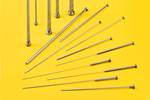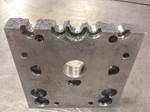Stainless Steel Ejector Pins Withstand Abrasive and Corrosive Resins, Offgassing
Regal components says the new line of ejector pins can withstand acids, vapors and gases resulting from molding materials like PVC.
Regal Components Inc. (East Providence, RI) has released a complete line of stainless steel ejector pins for processing plastics with highly abrasive and corrosive fillers. The Regal INOX type stainless steel ejector pins are made from 17Cr stainless steel that’s been hardened through to 52 to 55 Rockwell, with heads drawn to 40 to 45 Rockwell, which are capable of hot working up to 500 C.
Providing high wear resistance, Regal says the pins are ideal for processing plastics with abrasive and corrosive fillers where acidic fire-resistant vapors and offgases may be present.
Ideally suited for molding PVC in the medical and food industries, Regal INOX type stainless steel ejector pins withstand surface treatment or coating at temperatures higher than 200 C, including TiN nitriding and more. Featuring excellent dimensional stability, these 17Cr stainless steel ejector pins provide good machinability and are suitable for polished finishes.
Regal INOX ejector pins are priced from $4.25 each, depending on size and quantity, with no minimum order and the product shipped from stock.

Regal’s INOX ejector pins have been hardened to deal with corrosive and abrasive materials in the molding process.
Photo Credit: Regal Components
Related Content
-
What to Look for in High-Speed Automation for Pipette Production
Automation is a must-have for molders of pipettes. Make sure your supplier provides assurances of throughput and output, manpower utilization, floor space consumption and payback period.
-
Is There a More Accurate Means to Calculate Tonnage?
Molders have long used the projected area of the parts and runner to guesstimate how much tonnage is required to mold a part without flash, but there’s a more precise methodology.
-
Injection Molding: Focus on these Seven Areas to Set a Preventive Maintenance Schedule
Performing fundamental maintenance inspections frequently assures press longevity and process stability. Here’s a checklist to help you stay on top of seven key systems.












